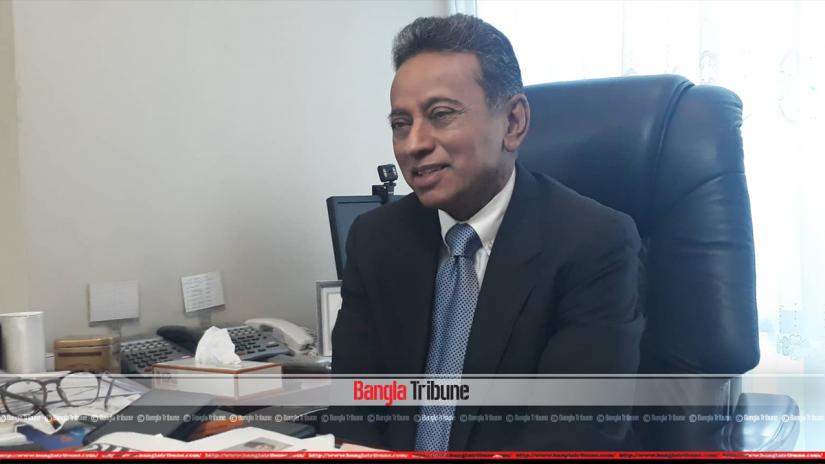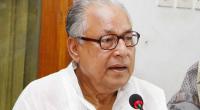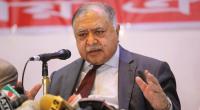
The BNP, aimed at revamping the party is mulling over several changes in the party, the most significant of which till now is the dissolution of its old Foreign Affairs Committee and formation of a new one.
The new committee saw many new faces with the party’s National Standing Committee member Amir Khasru Mahmud Chowdhury as its chief.
“The ruling Awami League has proved to be nothing but a failure in resolving the Rohingya crisis since it started,” Khasru told Bangla Tribune in an exclusive interview.
During the interview, the former commerce minister touched upon a few issues such as BNP’s foreign policy, India-China ties with the party, the international community’s stand on the 11th Parliamentary Election and reviewed Bangladesh’s attitude towards the Rohingya issue.
Khasru also cleared where the West stands on BNP’s ties with its long time ally Jamaat-e-Islam.
Bangla Tribune: You have been recently appointed to head the BNP’s Foreign Affairs Committee. What do you have to say about that?
Amir Khasru: There is no such thing as a leader; we all work as a team.
What’s the main challenge for the foreign affairs panel at the moment?
The challenge is moving forward with our “Friends with all, enemies with none” policy to maintain ties with all the countries.
We will keep them updated on our policies and what we think as a political party.
Since you are now in-charge will there be many changes in the perspective and party’s take on things?
I have to work according to the party’s strategy. We have to move forward and build ties based on mutual benefits while preserving the interest of the country.
There are more members in the new panel than the previous one. Any specific reason for that?
The number of members in a panel may vary depending on the party’s activities. It’s not really an issue. Since the party is expanding, the activists are more interested to be more involved.
How is BNP viewing the upcoming Indian elections?
The Indian election is the country’s internal affair. Whoever wins, we’ll work with everyone.
Its citizens will decide who they will vote for. It’s a matter of their domestic politics and we don’t want to interfere.
In that case do you see any pros and cons of a BJP or Congress win?
I’ve already said that BNP will not interfere with India’s internal politics. We have to maintain friendly ties with all. What matters is the relationship between the people of India and Bangladesh. A political party or group doesn’t have anything to do with who wins.
Last year you went to India and had talks with several think tanks and people inside and outside the government. Have there been any improvements since then? Especially given India’s disregard for BNP’s ties with the Jamaat-e-Islami?
Our ties with India are based on mutual respect for one another. It’s especially based on the friendship between these two countries and not on any political party or group. Hence ties with India are still intact and there’s nothing new to add there.
Last year you (BNP) took some initiatives to resolve the ongoing Rohingya crises. Do you have any new plans for it?
The government couldn’t handle the issue properly from the very start. Everyone remembers, it was even in the media that the government resisted them coming in. A proposal was also made to Myanmar for a joint operation.
BNP chief Khaleda Zia said, “We must let the Rohingyas in on humanitarian grounds. They are persecuted and stateless, but they will have to go back.”
They were sent back during the regimes of Ziaur Rahman and during Khaleda Zia. It’s only normal that they should go back this time. They have been given shelter on a humanitarian ground. When Khaleda Zia said this people, took a stand. Later when the international community took a stand for it, that’s when the government took it seriously.
What do you think is the government’s current stand?
The government wants to capitalize on it. Bangladesh as a strong, independent sovereign country isn’t being able to take the initiatives required to repatriate the Roingyas.
China and Russia have stood against the Rohingya issue at the United Nations multiple times. What do you have to say about that?
The bilateral agreements that the government signed aren’t very specific. How will they send the Rohingyas back, if they can’t even say it use the word? They have failed from the very begining.
The government couldn’t capitalise on the multiple opportunities to repatriate the Rohingyas like we did during BNP’s time.
For Myanmar, it’s all talk; they are not too keen to take the Rohingyas back.
The Myanmar army chief recently said that the state isn’t involved with the persecution of the Rohingyas. Do you think this is a change in stance or a ploy?
The whole world knows what’s going on. Look at the international reports and you will see that it talks about taking action against the military.
The entire West has taken a stand against Aung San Suu Kyi except China and Russia. What’s your take on that?
We have dealt with this twice – during the regimes of Khaleda Zia Ziaur Rahman. We made sure everyone was on board. I don’t know why they can’t do it. To be honest, I don’t really know where their friendship stands. We worked with the international community during the BNP rule. I don’t know why they are failing.
Do you have anything to say to the government regarding this?
We have experience and we are ready to help out. We have already done it twice. We offered a hand to the government but they refused. There is a need for national unity in the matter but they are not at all concerned with that.
BNP’s relation with China deteriorated 15 years ago. What are those ties like recently now that you have taken charge?
It doesn’t depend on me taking charge. The party has taken responsibility for it.
A lot of people are saying that there is a lack of good ties between BNP and China. Are there same talks in your party?
I don’t see any lacking. The ties are there. A BNP delegation went to China 4-5 days prior to the general election. These delegations go regularly at China’s invitation.
Many in the BNP think that those with Chinese affiliations missed out on nomination in the national polls. What do you have to say about that?
Friendships don’t depend on nominations to be honest. It’s a party’s internal affair who it will nominate. Friendships can’t depend on that and those you say these things lack foresight.
BNP’s nomination isn’t influenced by a country. BNP is an independent party and our politics isn’t dependent on anyone.
What’s the BNP’s stand on the government signing a pact with Saudi Arabia to deploy our military personnel in the Saudi-Yemen border?
The thing is the people have no idea about the pacts the government signs. They don’t know what it entails. No one, including the nation or the Parliament knows what’s in those agreements. Since they are not an elected government, they don’t feel accountable to the nation to keep them in the loop about the contents of the agreements.
Jamaat-e-Islami is a long time ally of the BNP. An assistant general secretary of theirs recently stepped down citing his reasons. How will you tackle that?
There is nothing to tackle here. The alliances, be it with Jamaat, 20-party or Oikya Front, are not based on ideology. Every party has their own ideologies. We have a common ground: restoring democracy, bring back good governance; basically our fundamental rights. We have come to an agreement but not ideologically due to the current political climate. Everyone will go their way when the political needs are over. We are not aware of Jamaat’s internal issues.
You discussed the complaints you had regarding the national polls with the diplomats at the foreign missions in Bangladesh. Was it fruitful?
The democratic countries of the world didn’t congratulate the government. They greeted them the same way they would any autocratic regime because of the ties. It’s not their duty to see who the people of Bangladesh voted for and who they didn’t. But their message is clear-the polls were questionable, it needs to probed, the people’s right to franchise was denied, the observers were forced.
They didn’t read the whole letter US President Donald Trump sent to congratulate them. Everyone including the Europen Union, UK, UN and democratic nations are of the same view.
You are a member of the National Standing Committee. BNP chief Khaleda Zia has been incarcerated since Feb 8, 2018. There have been internal proposals to reform get the party’s affairs into order. What’s BNP’s main political agenda for the future?
The main thing is to establish a democratic government and give people back their fundamental rights. We want to bring back the constitutional rights and to establish a government, accountable to the people, in the process.
It’s clear as the day that the ruling Awami League has snatched the voting rights of the people. There is no argument regarding it.
The main motive behind Khaleda Zia’s incarceration is to make way for an autocratic regime. Their plan is to wipe out democracy because if Khaleda Zia was out then it would never be possible for them to snatch people’s votes.


